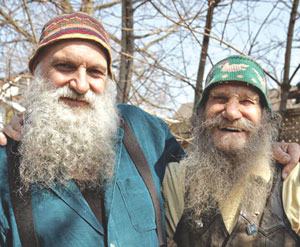HAMILTON, Ont. — Walter Tucker was probably grinning from the heavens as a small party of friends gathered at the Fletcher Creek park last month to share some cannabis “sacrament” and spread his ashes over the verdant countryside.

The 79-year-old legal gadfly and pot-smoking preacher had finally returned to the lush pastoral retreat he called Clearwater Abbey where he founded the Church of the Universe in 1969.
He and his disciples had enjoyed an idyllic romp on the site for several years — soaking up the sun, growing and smoking pot, and cavorting in the nude — until their eviction in 1986 over a lease dispute.
Tucker and his fellow travellers believed the property had been stolen from them and spent several years in court in an unsuccessful bid to get it back.
It was one of many court battles he had fought over the last 30 years.
The self-taught advocate, who died of heart failure in Hamilton earlier this spring, considered marijuana the “tree of life” and believed he had the constitutional right to smoke it as a sacrament in church.
With his impish grin, floppy hat, and casual attire spun from hemp, he had cut a colourful figure as he mingled among members of the Hamilton legal community.
Since the mid-1980s, he had often teamed up in court with Michael Baldasaro, a former bulldozer operator who wrote most of their legal briefs.
Following their eviction from Clearwater Abbey, they walked into a Guelph, Ont., courtroom wrapped only in orange prison blankets. They were dramatizing the fact they’d been dragged naked from their spiritual home.
The pair referred to themselves as “advocati ecclesiae” rather than something on the lines of lawyers or paralegals. The Latin phrase refers to laypersons of noble birth who defended the Roman Catholic church in the Middle Ages.
Tucker and Baldasaro usually started legal proceedings by politely asking the judge to address them as reverend or reverend brother. A few jurists eventually agreed to accord them the honorific.
But most judges refused, including former justice Joseph Scime.
During an exchange with Scime over the issue, Tucker suggested they could resolve their differences by sharing a joint.
“If we could just kick back and smoke a doob, I know we could get beyond this,” he told the stern-faced jurist.
Although he dropped out of high school, lawyering appeared to be in Tucker’s DNA.
His father, Adam Austen Tucker, had been lawyer and a Queen’s Bench judge in Saskatchewan.
Three of his siblings became lawyers, including a brother who was a drug prosecutor.
Describing his youth as “unmanageable,” Tucker once told a reporter he had spent time in the penitentiary for robbing a card game at gunpoint.
After a stint in the army, he moved to Hamilton where he worked as an electrician and salesman and started raising a family. But he gave up the nine-to-five life for good after founding Clearwater Abbey.
As part of the Church, he established the University of the Universe that offered legal training as well as Bible studies for its members.
Over the years, Tucker was repeatedly in court facing marijuana-related charges and other offences stemming from the Clearwater Abbey eviction.
The new millennium started off badly for Tucker, partly as a result of a prank he and Baldasaro tried to play on then-minister of health Allan Rock, who had approved a study of medicinal marijuana.
Authorities charged them with trafficking after mailing Rock small samples of homegrown weed for the study. The federal drug prosecutor quietly withdrew the charges in 2005.
The pair wasn’t so lucky three years later, though, when the court convicted them of selling $70 worth of pot to an undercover cop who pretended she wanted to join the church.
Superior Court Justice John Carvazan suggested they were common drug dealers, rather than spiritual crusaders, when he sentenced Baldasaro to a two-year jail term and Tucker, then 75, to one year in the reformatory.
An appeal court determined the sentences were too harsh and reduced the terms to five months for Baldasaro and three for Tucker.
Former Hamilton Spectator reporter Barbara Brown, who covered the Hamilton courts for a quarter century, told Law Times she considers Tucker a “pioneer in the fight to legalize marijuana in Canada.”
“A part of me always believed that marijuana as a sacrament was a cynical ploy under the guise of religious freedom to get around the draconian marijuana laws,” she wrote in an e-mail.
“But even after exhausting every avenue of appeal, the irreverent reverends continued to walk the walk and talk the talk, never straying from the core beliefs of the church,” she added.
But their passion and oratorical skills didn’t always go over well in court, she suggested.
“From my front-row perspective, the response from the Hamilton bench to the legal antics of Tucker and Baldasaro ran the gamut from amused tolerance to disdain and annoyance that this merry band of hippies tied up so much court time defending an unrealistic position,” she said.

 The 79-year-old legal gadfly and pot-smoking preacher had finally returned to the lush pastoral retreat he called Clearwater Abbey where he founded the Church of the Universe in 1969.
The 79-year-old legal gadfly and pot-smoking preacher had finally returned to the lush pastoral retreat he called Clearwater Abbey where he founded the Church of the Universe in 1969.